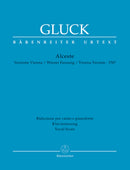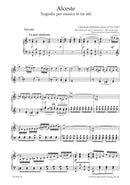| 作曲者 | Christoph Willibald Gluck (1714-1787)・グルック |
| タイトル | Alceste (Vienna Version 1767) (ヴォーカル・スコア) |
| サブタイトル | Tragedia per musica in 3 acts |
| 出版社 | Bärenreiter・ベーレンライター |
| シリーズ名 | BÄRENREITER URTEXT |
| 楽器編成 | Solos, Mixed Choir, Orchestra |
| 楽器編成(詳細) | 4Sg-S-solo,2Sg-T-solo,2Sg-Bar-solo,3Sg-B-solo,MixedCh-SATB,Tz-Bal,Orch |
| 品番 | 9790006558728 |
| 校訂者 | Gerhard Croll |
| 編曲者 | Hans Schellevis |
| 言語 | イタリア語、ドイツ語 |
| 形状 | XVI, 349 ページ・27.0 x 19.0 cm・969 g・ソフトカバー |
| 演奏時間 | 135分 |
| 出版年 | 2019年第1刷 |
| 出版番号 | BA 5844-90 |
| ISMN | 979-0006558728 |
| その他 | Vienna version 1767 |
With the premiere of Gluck's "Alceste", the "Burgtheater" Vienna reopened its doors, concluding a period of mourning that had been decreed following the death of Archduchess Maria Josepha.
Calzabigi's inspiration for the libretto, which, despite including an element of wonder, focuses entirely on death and the afterworld, most likely stemmed from the death of Empress Maria Theresia's husband. In Euripides' "Alkestis", the librettist might have recognized a sufferer akin to the imperial widow, who was highly regarded by her people. Following in the Greek tragedy tradition, Gluck once more sought to emphasize the unity of the work as a whole and the interplay of all elements involved, including costumes and stage design. He placed great importance on integrating the chorus into the happenings on stage.
Bärenreiter now presents a newly engraved vocal score which has been meticulously revised, corrected and adapted to meet current Bärenreiter standards.





